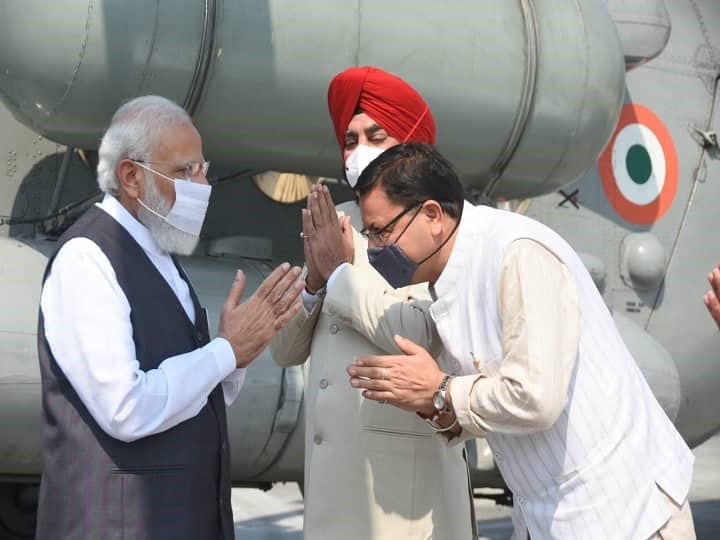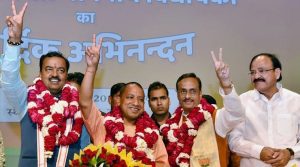
BJP steps down from high moral ground with Dhami's return as Uttarakhand CM

Bharatiya Janata Party leader Pushkar Singh Dhami lost from Khatima constituency in Uttarakhand by a sizeable margin of almost 7,000 votes, or almost seven per cent of the popular vote in the recently held Assembly elections.
In a constituency of barely 90,000 voters, this is a considerable difference between victor and the vanquished. Yet, he went on to get re-elected as the leader of the BJP legislature party and by virtue of this, is set to take oath as Chief Minister (CM) once again.
This development has resulted in speculations over Keshav Prasad Maurya’s continuation as Uttar Pradesh’s deputy chief minister because he too lost his seat from Sirathu constituency, again by almost the same margin in terms of votes as Dhami and more than three per cent of the popular vote.
Dhami’s continuation, however, is constitutionally permissible and the Opposition cannot question the decision because Mamata Banerjee continued as CM last year despite losing from the Nandigram seat by a big margin to bête noire Suvendu Adhikari. Like the West Bengal CM, Dhami has six months to return as a member of the Uttarakhand Vidhan Sabha.

Regardless of whether Maurya too gets a new lease of life in his position or not, Dhami’s continuation reverses the tradition established almost a quarter of a century ago when the Bharatiya Janata Party’s moral compass, the Rashtriya Swayamsevak Sangh, opined that leaders who get defeated in parliamentary or assembly elections, should not be appointed ministers till re-election as lawmakers.
This tradition, ‘enforced’ dramatically at midnight before Atal Bihari Vajpayee took the oath of office as Prime Minister in March 1998, has, however, been observed alternately in violation and adherence. Recalling these instances will cast the spotlight on the BJP’s changing righteous posture and also the party’s increasing comfort with realpolitik.
Also read: How BJP’s revised one-on-one strategy made them win UP again
The Lok Sabha verdict in March 1998 made it clear that the BJP would get to form the government though the meagre tally of 182 seats; it also meant that the coalition had to be put together painstakingly with participating or supporting parties extracting their pound of flesh.
In 1996, when Vajpayee was PM for 13 days, he appointed the late Jaswant Singh as his finance minister and it was widely speculated that he would get this old job back although he surprisingly lost the Lok Sabha election from Chittorgarh, Rajasthan.
Likewise, Pramod Mahajan, another important BJP leader who had been defence minister in 1996, was expected to be part of the Union cabinet. But, he too lost from the Mumbai northeast constituency. While he had grown from the ranks within the Sangh Parivar and BJP, Jaswant Singh was a lateral entrant into the BJP and not a great friend of RSS hardliners because of his liberal outlook and friends in the industry, especially members of the Bombay Club.
The RSS did not wish Jaswant Singh to become the finance minister but to say so overtly would be politically controversial. As a result, they formulated this ‘ethical’ argument that because the BJP was committed to being a ‘party with a difference’, it should set high moral principles.
Consequently, it directed Vajpayee that those who lost their seats should not be part of the government. This message was communicated by KS Sudarshan, not among the best of Vajpayee’s friends or admirers.
But since Mahajan too had lost the election, his name was dropped at the last minute. The two continued as close confidantes of Vajpayee and held executive positions before being elected to the Rajya Sabha and made ministers. In time, this became the principle in the ‘old BJP’ and people like Arun Shourie were made Union minister only after getting elected to the Upper House.
Also read: BJP’s welfare progs, Hindutva politics & Modi trumped in UP
Time elapsed, the BJP lost power for a decade and such dilemmas did not grip the party till 2014, by when, there had been a change of guard in both the BJP and RSS. It also increasingly stopped trying to ‘be different’ and instead became a copycat version of other parties.
The balance of power and personal ties between the two organisations and leaders also had been reworked as a result of which when PM Narendra Modi inducted Arun Jaitley and Smriti Irani into his ministry in May 2014, there were no murmurs of protests from the RSS. It is true that both were at that time members of Rajya Sabha, but the RSS leadership would most likely have argued in a different era that a ‘defeat is a defeat.’
Although the former Himachal Pradesh CM, Prem Kumar Dhumal was a confidante of Modi from the years he managed party affairs in the state in the 1990s, he was not re-nominated to the position in 2017. His position was no different from Dhami’s – the party returned to office after a gap of five years with a comfortable majority, but Dhumal lost the seat he contested – Sujanpur, to a former protégé turned bitter rival.
Dhami has not met Dhumal’s fate because of reasons rooted in state politics besides the central leadership’s decision to back Dhami despite his personal loss. In 2017, Dhumal was named as the party’s chief ministerial face at the fag-end of the campaign. At 73, he was not getting any younger and the BJP was beginning to look into the future. Because his son, Anurag Thakur was going from strength to strength, there was no possibility of Dhumal raising the banner of revolt.
The 45-year old Uttarakhand CM assumed office in July 2021 after a none-too inspiring performance by two predecessors and in the run-up to the assembly polls, he was seen as a leader who had somewhat restored the party and state government’s credibility, although the victory was more the result of the Congress’s failure and Modi’s decisive push to the campaign. He is certainly being retained with an eye on the years ahead.
Despite the BJP’s embrace of practical tactics, there is no escaping the reality that from the moral high ground it occupied in 1998, the RSS has yielded more liberty and autonomy to the BJP on political decisions.
It is true that in March 2017, the Nagpur-based leadership played a not so insignificant role in Yogi Adityanath being the final choice as CM. But, that was when Modi’s assertive presence within the Sangh Parivar was yet to assume the proportions it has now. Over the next few days, Maurya’s fate too will be known and a clear picture will also emerge over whose writ finally runs on government formation in UP.
The deputy chief ministerial faces and choices of individual ministers will also provide an indication of the equation between the state and central leadership.


